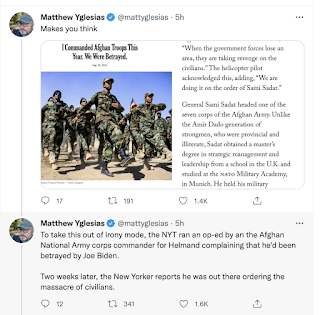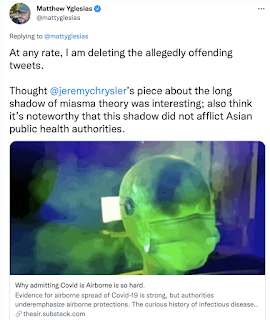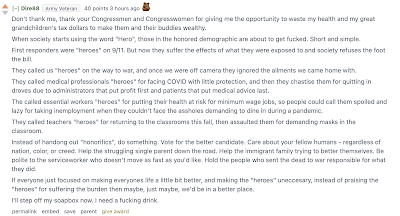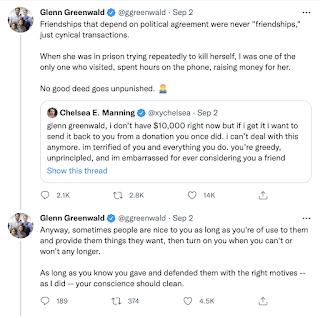Nelson Lowhim's Blog, page 39
September 15, 2021
War against democracy.
And you can easily see the sort of "top of the meritocracy heap" mindset where the elites can never fail, only be failed, thinking (interestingly enough, the kind of commie thinking that led to so much heartache in the countries she had written about, nevertheless).
It goes on with the link above.


This is how our elites are thinking right now. All critics of the status quo are losers (and she makes sure to point out the right, then paint the left with the same brush [1]). That's it. No idea about how to improve a damn thing. Or even, the system is so good in finding talent, well, can we be blamed for these losers? Note, this is in a country with a large amount of death and misery from the past couple decades (nvm what it's inflicted elsewhere). Life expectancy dropping, but I imagine that's all the same to her and that ilk.
Speaking of her ilk, Friedman, the guy who wanted nothing but war (and never revisited his logic) and also told us MBS was the modern future the ME needed... well he's shocked that we've turned int o a version of the ME dead-democracy that we were meant to change. Shocking. Wonder if there will be any self-awareness with this one either.
Well, ladies and gentlemen, our meritocratic elite. Meanwhile, after dems fought off some bs GOP recall election, our centrists ask why didn't the GOP have a more reasonable person (while the GOP is claiming this is all a stolen election)? Just amazing galaxy brain stuff here.
Oh, and a general took power from the last POTUS. I don't like the guy, and I know it happened with Nixon too, but fuck what a worthless system that levers the constitution has don't work, so these extrajudicial means are taken instead. Seriously, this and "all elections we lose are stolen" GOP, nvm the SCOTUS and their "fuck the reconstruction amendments" really mean the constitution is more or less dead and theocrats can do what they want if they wanted to.
And, to get an idea of our elites' level of morality, here's a bird being exceptionally cruel to its own child. Serious NSFL stuff so don't watch if you can't stomach infanticide (even if a bird)
[1] Note, that I kinda think this is why rich thing grassroots have a more top down element to them. The rich want them as a buffer. 1/2 fights the other 1/2, kinda thing, but with crazies like anti-vaxxers in the mix, if you paint them all with the same brush, you have less criticism in general.
Enjoyed it? Share it via email, facebook, twitter, or one of the buttons below (or through some other method you prefer). Thank you! As always, here's the tip jar. paypal.me/nlowhim Throw some change in there & help cover the costs of running this thing. You can use paypal or a credit card.


September 14, 2021
The War Against the Poor
Also, speaking of the war on the poor, it would appear that our wars and the previous wars (that is the Israelis and S. Africans training our people, and they do... no surprise that pro-apartheid soldiers are helping our own ones. So hearing about the new war and how mercs are pointed towards the poor in S. Africa is helpful:
This is a reply on r/chomsky. Decent spot. Anyways, this is complete craziness.
rom Anton_Pannekoek via /r/chomsky sent 29 minutes ago
Recently a whistleblower called Babita Deokaran got murdered.
The poor people's movement I refer to is the Shack Dwellers movement, known as Abahlali baseMjondolo. Their members have been targeted by the police for assassination, as well as arrested arbitrarily and detained on spurious charges (where they're obviously intimidated). Our police are very brutal with almost no repercussions for their brutality or oversight.
https://www.dailymaverick.co.za/article/2018-09-12-no-justice-for-assassinated-abahlali-activists/
context full comments (14) report block user mark unread reply
"On Monday, minutes after dropping her child at school, Deokaran lay seriously injured in her bullet-ridden car outside her complex in a quiet suburban street in Johannesburg.She was rushed to hospital, where she later succumbed to her injuries
After her death, it emerged she was a witness in a Special Investigating Unit (SIU) investigation into corrupt personal protective equipment (PPE) deals worth R332 million in the department."
Yeah, this is our world. And our media will never cover it. Here's someone who dares to ask for more than a penny to go to those who live in shacks:
"S’fiso Ngcobo‚ chair of the body in eKukhayeni‚ was shot and killed outside his home around 7.30pm.
Abahlali baseMjondolo spokesman Sbu Zikode said on Wednesday morning that a group of unknown men descended on his house and opened fire.
“He was shot about seven times. We will be able to provide more details on this assassination in the coming hours. We are going back to the family home to get more information‚” he said. The shooting followed the wounding of Ndumiso Mnguni‚ alleged to have been shot by the security detail for the city’s anti-land invasion unit also on Tuesday."
And don't worry. Just like we have our own theocratic SCOTUS here in the US, SA has their courts trying to prosecute the ones being targeted for murder. I'm serious, after reading Gulag Archipelago, I think our system takes over theirs, though perhaps we have more talent and experience in gaslighting and imagination in making it seem legit, while they didn't.
And don't worry, the courts won't work for the poor. The police either.
"Just metres from 28-year-old Phumzile Mkhize’s shack, perched on a steep hillside in the Durban informal settlement of eKukhanyeni, two bullet holes mark the wall of a local spaza shop where her late husband S’fiso Ngcobo was shot dead while buying cool drinks on 23 May."
Just in case you think this is poor countries only, note that Bibi got this done when someone tried to look into his corruption. So this is Greece. And remember that the journalist who ratted McCrystal out died mysteriously in a car accident. The one who leaked the Panama papers also died mysteriously. So do not forget that the corrupt octopus that people in Iraq etc are fighting is one and the same as what we're dealing with here at home, to include grifters selling anti-vaxx snake oil.
So again, our rich are making a grab for everything (it's the only thing they know how to do) and trying to stop all who dare to even whisper about it). Be safe. [2]
[1] For example, threatening a hospital after an anti vaxxer dies from Covid, and man are those in the med field tired of this:
"No, I don’t mean I’m exhausted from a COVID infection. I’m exhausted from this God forsaken pandemic.
Emotionally, physically, mentally.
The usual, friendly chit-chat that takes place between myself and my favorite palliative docs and intensivists is replaced by monotone conversation about the futility of care for our patients.
I’m tired of seeing the look on the physicians face when I tell him it’s probably time to intubate.
I’m tired of quack family members calling the unit insisting insane treatment options and calling me 5000 times a day only for me to tell them the same thing over and over and over endlessly every single day .. “they’re doing worse.. they’re on maximum support.”
I’m tired (and no this is not controversial.. this is the reality) of 400+ pound patients. All of them. Proning... taking them to CT... cleaning them up. None of them survive.
I am so tired.
I never traveled. I was trusting that my organization would take care of me... so I got a $3 raise..
When everyone started to complain, admin said “I mean what amount $ do you expect??”
I don’t know? We come to work and die inside a little each day, so what’s the price for my soul?
How long can we do this?
Again, and again:
"We had a very bad day on my unit today, worse than the normal bad days we've had. Lots of young people crashing, multiple people from the same family sick or dying. So many of our staff were taking a moment to cry in a quiet place.
I went around and checked in on everyone, just to try to talk with them for a little bit and help them vent. The Chaplains are now checking on staff each shift.
A breaking point is coming, for all healthcare workers.
Usually you have that devastating case that's tough to deal with every few months. We now have one everyday or sometimes multiple times per day. It's exhausting like you said.
I don't know how to make it better, but you are not alone. Hang in there"
Part of the 1/2 fights the other, is the consumer mentality that we've been fed:
"I feel you. I'm not on the ICU side of things, I'm on the ER side. Triage is horrible. Lines of ambulances dropping off patients. Family members trying to start fights because we won't let them inside. Death stares from patients waiting in line, many for B.S. things that they "just want to get checked out". This week, I probably triaged 150 patients during one of my shifts. There was a line from the second I sat down (outside in 90 degree heat) to the second my shift ended. While triaging, had people yelling at me to go out and help someone get out of a car for shoulder pain from a fall. Went to do that, and people started yelling at me for not checking them in. The second people check in, they turn helpless. Can't walk to the bathroom (or they just shit on the floor), need a turkey sandwich, etc. One patient yelled at me for not getting him water, after just getting out of a critical Covid room. Short-staffed, no breaks. The ER sucked before Covid. It really sucks now. Come home utterly exhausted and feeling defeated, like nothing we do matters. People protesting in front of our ER about the mask/vaccine mandate. Literally yelling at us for taking care of patients. How quickly we went from Heroes to Hated."
We are apes and it's really easy to get us to fight each other:
"I was an ER tech in North Idaho. I started hating my job when my hospital started chasing time based metrics and top box scores. After almost a year and a half of dealing with covid I quit. I couldn't deal with the stress of being yelled at all the time, being expected to cover the whole 36 bed er because of being short staffed, dealing with needy nurses and overly entitled patients. I was threatened daily because of the hospital policies and for enforcing them. I rarely felt backed by the charge nurse or management when trying to uphold the rules and wear appropriate ppe. I was chewed out by multiple nurses for handing them a gown because the patient was "just a cold" and "not covid." I was emotionally exhausted. It wasn't anything close to what I wanted to do anymore so I quit. I was good at my job. I couldn't deal with the overwhelming suckage of a lot of the people around me. I stuck around for my friends at work, and I decided it wasn't worth it.
I now work in a warehouse and lost 20lbs and am back in a good bmi. I'm 3 months out and I still wake up almost in an anxiety attack because I had a dream that I had to go back to working in the ER. I work with a few anti covid vaccine people, but they understand why I left and they explained their reason for not getting the vaccine. Mostly was based off of they felt they were healthy and there wasn't much long term data about health effects later in life. Their reasoning seems okay to me and they don't judge me about anything. I do wish they would get vaccinated, but they are okay with the risk of not getting the shots and I have explained the data behind the mrna vaccines. I'm sorry for ranting, but I feel like I needed to vent. I empathize with people still surviving in healthcare and I feel bad for leaving but I can't put my life and family in that much stress. I work more hours, more days and I don't feel nearly as exhausted all week as I did in the ER."
Do you get what I'm saying?
The number of COVID patients I hear 911 calls for, or that I've transported, that don't seem to grasp or care that part of having COVID is (typically) being sick. You will feel unwell, you will feel miserable, it is not fun. And, no, there is no magic pill to make it all go away that the ER will give you. Transport after transport of stable, medically unnecessary COVID patients because they feel tired and have body aches, or they feel weak, or they have a headache and don't care that the last ER they went to 2 days ago checked them out and sent them home.
The specific patient I'm thinking of here I transported her last week. She was +, complaining of fatigue, body aches, feeling weak, vitals, sats, and lungs were stellar. I honestly told her and her daughter the ER would, likely, be sending her home after a few hours. She said, "I'm sorry I'm infecting you." I didn't answer, because I didn't have anything polite or diplomatic to say. And two days later I saw her at a different ER when a different crew transported her because she had a headache and didn't feel well because the last ER didn't magically make it all better. And no, she wasn't vaccinated. Her daughter also didn't understand why she couldn't wait next to her COVID+ mother's stretcher in the 'ambulance only' entrance, with all the other waiting EMS stretchers which, theoretically, contained legitimately sick and injured people.
The ERs locally are getting crushed. They've maxed out on hallway beds and it's not enough. The waiting rooms are packed with dozens of people waiting for hours on end. I was at one of them today and snuck a glance at the status board, and approximately 25% were COVID or COVID R/O. A local ER I keep having issues with was, per a provider there, boarding 35 patients in the ER when they only have approximately 50-55 beds. A week before that they were boarding 20.
And the relationship between EMS and the local ERs has deteriorated, badly. The state Department of Health is now involved because of the EMS offload times in my county are, without exaggeration, the worst in the state. The local emergency services system is being badly stretched by two factors: A) There is a shortage of Paramedics. B) The ERs are holding crews in hallways for hours on end which directly contributes to a realtime shortage of ambulances, in addition to accentuating burnout. Two local fire departments recently sent a public letter to the hospitals informing them that, per cited DoH protocol X, after 30 minutes their crews will proactively be finding any available place or surface for their patient without further delay. I got a complaint from an ER recently because while waiting 100 minutes in a hallway with a patient across the hall from an empty room I went around and counted the other empty beds in the ER. They didn't like that, and I was told I am not to leave my stretcher. That happened to be the day the nurse manager in that ER learned that not only is the state keeping them under a close microscope and having EMS record offload times in detail (which we in turn report to the state DoH), but no, per the DoH you can't forbid EMS from walking around counting beds (the DoH literally told us to do this). Nothing happened to me, and I just happened to be working with my supervisor that day. This is the same ER that has repeatedly told EMS not to bring their COVID patients into the ER, but instead leave them in the ambulance for the time being. This is a straight up EMTALA violation, and the hospitals are aware of it and have been told not to do it. The result is a toxic mix of exhaustion, frustration, and burnout that is affecting both EMS and ER staff alike, and which each readily channels towards the other. In the same ER I keep having problems at recently I overheard one of the PAs say they were boarding 35 patients in the ER, out of approximately 50 beds. I am not a naturally confrontational person and consider myself fairly genial, but I am straight up running out of fucks to give when it comes to dealing with local ERs (not all hospitals/ERs are created equal, or incompetent).
I am afraid that my area is potentially in for a very, very, long winter.
This kind of stress on the system, and the infighting will lead to something and it doesn't always lead to the right people who caused it, the ones above the fray, getting blamed for it.
[2] Note how things like social media, (IG), does actual harm to teens. Especially teen girls. This is some sick shit, and the likes of Zuckerberg know it but don't give a fuck.
Enjoyed it? Share it via email, facebook, twitter, or one of the buttons below (or through some other method you prefer). Thank you! As always, here's the tip jar. paypal.me/nlowhim Throw some change in there & help cover the costs of running this thing. You can use paypal or a credit card.


September 13, 2021
From the Land Down Under
Finished this book last week. Notes from a Foreign Country . It has some interesting value. You get to see how a provincial American lives overseas and expands their view of the world. That is certainly worthwhile. There's even a section on Afghanistan. But like many she doesn't seem to fully grasp the level of robbery the place is all about. She sees it in other places, so, again, it's worth reading for that.
Meanwhile, the anti-vaxx crazies keep coming on. And just so you know, I have feeling that the same animal spirits and powers that be feeding this dumb (the grifters from top to bottom) are the same killing environmental activists. The killings here are probably carried out by people I trained with or was trained by or people they trained. How can I say such things? Look at what the DOD and our "homeland security" labels as terrorism. Anyone even thinking about disrupting energy supply lines, aka the destruction of the planet. Make no mistake, these are hit squads, shooting people dead in their living room for trying to save the planet from our filthy rich elites. Definitely the extraction industry types. [1]
Well, one wonders if there will be enough outrage for change. We have all the signs of lowered trust in the powers that be, except it's the wrong kind (anti-vaxx or even, CC is a hoax) and it's probably not goin got work out like we think. Or will it change? Thinking about the cyclone that hit Bangladesh. How it killed so many, leading to mistrust and anger at the government (who were the cause of that and showed complete callousness to the victims, since they were darker, btw) and, after a genocide, revolution. Not that we get the same, but the lack of care from the elites will cause a reaction. Will it be at the right people or the wrong ones (blame immigrants, for example)? Hard to predict.
[1] Note how me and a friend of mine never cared for Thunberg. After all, why was she, and not these other dark activists who put their lives on the line, getting such media fanfare? Well, she's white, so that helps, I'm sure, but at least she has pointed this story out on her twitter. This story she shared, shows how bad Africa has it. In fact, I'm of the mind that Africa was the first continent to suffer from CC.
Enjoyed it? Share it via email, facebook, twitter, or one of the buttons below (or through some other method you prefer). Thank you! As always, here's the tip jar. paypal.me/nlowhim Throw some change in there & help cover the costs of running this thing. You can use paypal or a credit card.


September 12, 2021
Reign of Terror
Like I said before. Lies on top of lies and all to make a few rich.
On a lighter note, I recommend this Tales from Japan book. Solid tales if not a little grizzly. Not sure that it beats Calvino's Italian folktales or Malachite Casket , but it's up there.
[1] I do know the right, as in the GOP, back then did not like this as it was too close to their views, but they were lucky that he wasn't called a white supremacist since that would have blown most of their cover.
Enjoyed it? Share it via email, facebook, twitter, or one of the buttons below (or through some other method you prefer). Thank you! As always, here's the tip jar. paypal.me/nlowhim Throw some change in there & help cover the costs of running this thing. You can use paypal or a credit card.


September 11, 2021
Is the Internet Dead?
btw, here's Doctorow giving advice to a young writer.
Enjoyed it? Share it via email, facebook, twitter, or one of the buttons below (or through some other method you prefer). Thank you! As always, here's the tip jar. paypal.me/nlowhim Throw some change in there & help cover the costs of running this thing. You can use paypal or a credit card.


9/11
Edit: Again, I'm not being obtuse here, and being one of those who bought the con hook line and sinker, I still get emails like this:

Greatest time of need? That's right now, people. The enemy within. Are people not aware that a 9/11 worth were dying everyday in the height of the 😷 pandemic? That it's happening right now every 2 or 3 days? That CC will make those numbers even worse? Again, there is a time of need that dwarfs 9/11 and it is now. But unfortunately, we currently have too many people on team apocalypse, so we can't actually do anything.
[1] Not entirely mocking it, but come the fuck on. I get that emotion, and for the younger ones, fine. but for older people, grow the fuck up, unless you actually lost people that day. Again, an inability to think at all. And I'm not saying every one of the elites were lying, though with them who knows if they know what a lie is. Hell, I even think that they were certainly shocked that it happened (see how they reacted to the shock of reality that was Afghanistan falling) but mainly cause it happened to them and their reality. Those planes hit the Bronx or elsewhere and they don't get our elites as shook up. See, again, the deaths of covid. An initial shock. Some were more sociopathic than others and immediately shifted to making a profit off this, especially when they saw the masses behind them, and unquestioning. SO it goes.

Enjoyed it? Share it via email, facebook, twitter, or one of the buttons below (or through some other method you prefer). Thank you! As always, here's the tip jar. paypal.me/nlowhim Throw some change in there & help cover the costs of running this thing. You can use paypal or a credit card.


September 10, 2021
Summa Ahht.
The issue itself is here! Very cool art and glad to be included. I'm on page 83! Get the prints right here. That's it for now. More kids stories for me. Peace.
Enjoyed it? Share it via email, facebook, twitter, or one of the buttons below (or through some other method you prefer). Thank you! As always, here's the tip jar. paypal.me/nlowhim Throw some change in there & help cover the costs of running this thing. You can use paypal or a credit card.


September 7, 2021
I've Been Everywhere, Man.
Speaking of sad, 😔, read this article on Afghanistan. The rural parts. Definitely a different story and one you didn't hear much about during the "let's blame Biden for everything." Again, you can see why the entire edifice collapsed just like that.
In this way, Shakira’s tragedies mounted. There was Muhammad, a fifteen-year-old cousin: he was killed by a buzzbuzzak, a drone, while riding his motorcycle through the village with a friend. “That sound was everywhere,” Shakira recalled. “When we heard it, the children would start to cry, and I could not console them.”Note that this part of the war, we might just be continuing.
 oh, lookie, hardcore propaganda from a war criminal on the Times.
oh, lookie, hardcore propaganda from a war criminal on the Times. I mean, the list of brutality is bad:
Then, take a look at the responses and how ham-fisted they were:
Muhammad Wali, an adult cousin: Villagers were instructed by coalition forces to stay indoors for three days as they conducted an operation, but after the second day drinking water had been depleted and Wali was forced to venture out. He was shot.
Khan Muhammad, a seven-year-old cousin: His family was fleeing a clash by car when it mistakenly neared a coalition position; the car was strafed, killing him.
Bor Agha, a twelve-year-old cousin: He was taking an evening walk when he was killed by fire from an Afghan National Police base. The next morning, his father visited the base, in shock and looking for answers, and was told that the boy had been warned before not to stray near the installation. “Their commander gave the order to target him,” his father recalled.
Amanullah, a sixteen-year-old cousin: He was working the land when he was targeted by an Afghan Army sniper. No one provided an explanation, and the family was too afraid to approach the Army base and ask.
Ahmed, an adult cousin: After a long day in the fields, he was headed home, carrying a hot plate, when he was struck down by coalition forces. The family believes that the foreigners mistook the hot plate for an I.E.D.
Niamatullah, Ahmed’s brother: He was harvesting opium when a firefight broke out nearby; as he tried to flee, he was gunned down by a buzzbuzzak.
Gul Ahmed, an uncle of Shakira’s husband: He wanted to get a head start on his day, so he asked his sons to bring his breakfast to the fields. When they arrived, they found his body. Witnesses said that he’d encountered a coalition patrol. The soldiers “left him here, like an animal,” Shakira said.
Entire branches of Shakira’s family tree, from the uncles who used to tell her stories to the cousins who played with her in the caves, vanished. In all, she lost sixteen family members. I wondered if it was the same for other families in Pan Killay. I sampled a dozen households at random in the village, and made similar inquiries in other villages, to insure that Pan Killay was no outlier. For each family, I documented the names of the dead, cross-checking cases with death certificates and eyewitness testimony. On average, I found, each family lost ten to twelve civilians in what locals call the American War.
Marzia, a woman from Pan Killay, recalled, “The Taliban would fire a few shots, but the Americans would respond with mortars.” One mortar slammed into her mother-in-law’s house. She survived, Marzia said, but had since “lost control of herself”—always “shouting at things we can’t see, at ghosts.”I do feel this one because I've heard several people say they did just that. But, they claim, "it worked". Sure, in the short term, but not long term.
And, again, we only heard a couple weddings here and there, but look at this evidence of following any funeral and hitting that too.
That night, an American bomb slammed into the room where the twin boys were sleeping, killing them. A second bomb hit an adjacent room, killing Mohammad’s father and many others, eight of them children.
The next day, at the funeral, another air strike killed six mourners. In a nearby village, a gunship struck down three children. The following day, four more children were shot dead. Elsewhere in Sangin, an air strike hit an Islamic school, killing a child. A week later, twelve guests at a wedding were killed in an air raid.
Oh, and what about the new warlords we left in charge? The kind trained in our hallowed elite institutions?
See the above pic. Sounds rough, huh?
In the hamlet of Yakh Chal, I came upon the ruins of an Afghan Army outpost that had recently been overrun by the Taliban. All that remained were mounds of scrap metal, cords, hot plates, gravel. The next morning, villagers descended on the outpost, scavenging for something to sell. Abdul Rahman, a farmer, was rooting through the refuse with his young son when an Afghan Army gunship appeared on the horizon. It was flying so low, he recalled, that “even Kalashnikovs could fire on it.” But there were no Taliban around, only civilians. The gunship fired, and villagers began falling right and left. It then looped back, continuing to attack. “There were many bodies on the ground, bleeding and moaning,” another witness said. “Many small children.” According to villagers, at least fifty civilians were killed.
Later, I spoke on the phone with an Afghan Army helicopter pilot who had just relieved the one who attacked the outpost. He told me, “I asked the crew why they did this, and they said, ‘We knew they were civilians, but Camp Bastion’ ”—a former British base that had been handed over to the Afghans—“ ‘gave orders to kill them all.’ ” As we spoke, Afghan Army helicopters were firing upon the crowded central market in Gereshk, killing scores of civilians. An official with an international organization based in Helmand said, “When the government forces lose an area, they are taking revenge on the civilians.” The helicopter pilot acknowledged this, adding, “We are doing it on the order of Sami Sadat.”
General Sami Sadat headed one of the seven corps of the Afghan Army. Unlike the Amir Dado generation of strongmen, who were provincial and illiterate, Sadat obtained a master’s degree in strategic management and leadership from a school in the U.K. and studied at the nato Military Academy, in Munich. He held his military position while also being the C.E.O. of Blue Sea Logistics, a Kabul-based corporation that supplied anti-Taliban forces with everything from helicopter parts to armored tactical vehicles. During my visit to Helmand, Blackhawks under his command were committing massacres almost daily: twelve Afghans were killed while scavenging scrap metal at a former base outside Sangin; forty were killed in an almost identical incident at the Army’s abandoned Camp Walid; twenty people, most of them women and children, were killed by air strikes on the Gereshk bazaar; Afghan soldiers who were being held prisoner by the Taliban at a power station were targeted and killed by their own comrades in an air strike. (Sadat declined repeated requests for comment.)
The day before the massacre at the Yakh Chal outpost, CNN aired an interview with General Sadat. “Helmand is beautiful—if it’s peaceful, tourism can come,” he said. His soldiers had high morale, he explained, and were confident of defeating the Taliban. The anchor appeared relieved. “You seem very optimistic,” she said. “That’s reassuring to hear.”Our elites are truly worthless beyond the pale. Again, a true scorch the earth policy, so how nice do you think the survivors will be? And, most who did the evil will get away scot free while the women of places like Kabul, innocent of all this, will bear the brunt of it. Don't get it twisted, staying was never an option. We just kept digging the grave for them.
So hopefully we use Afghanistan as a case for how to deal with drought and war conditions and help them turn it around. Lol, as if our elites cared for those people. But gotta fight for that.
ON to 🦠 News.
On the whole horse dewormer bit, here's some more on it. Kinda murkier than thought. Though it would still be wise to wait for more info on it.
"One of the authors of the meta-analysis, statistician Andrew Bryant at Newcastle University, UK, says that his team corresponded with Elgazzar before publishing the work to clarify some data. “We had no reason to doubt the integrity of [Professor] Elgazzar,” he said in an e-mail. He added that in a pandemic setting, no one can reanalyse all of the raw data from patient records when writing a review. Bryant went on to say that his group will revise the conclusion if investigations find the study to be unreliable. However, even if the study is removed, the meta-analysis would still show that ivermectin causes a major reduction in deaths from COVID-19, he says."
And there's some level of trying to head off the science before it's better studied, and that kinda thing really destroys trust. Because note the amount of people in those trials (30k) is dwarfed by the amount of people who have been vaccinated. So don't listen to grifters trying to sell you on something not yet proven (or less proven than sth like the vax... though this puts people's har har it's for horses stuff in the right context).
Carlos Chaccour, a global-health researcher at the Barcelona Institute for Global Health in Spain, says it has been difficult to conduct rigorous studies on ivermectin. That’s partly because funders and academics in wealthy countries haven’t supported them, and, he suspects, have often dismissed trials of ivermectin because most of them have been done in lower-income countries. Furthermore, says Rodrigo Zoni, a cardiologist at the Corrientes Cardiology Institute in Argentina, it is difficult to recruit participants because many people — particularly in Latin America — are already taking the widely available drug in an attempt to prevent COVID-19.

That's all good, but what about this argument?



My only takeaway is why our health system/people were so behind the Asian ones? We need to learn something and fucking fast at that. We in the west did good vaccine style, but if we don't recover this last aspect we are losing in a big way (note, many of these places are run by people who previously learned from and looked up to the CDC). Again, how much of this is on Reagan's head? Him and his slash all gov idiocy and the derivatives that came after? Really need to look into it, people.
Trust is a huge issue, tbf:

Again, our elites need more accountability. Speaking of which, it's not happening:

 Any how, here's a fellow vet with some moment of truth for you:
Any how, here's a fellow vet with some moment of truth for you:
Anyways back to the title of the post: what about having been everywhere, man?
Well I have, but the thing is, claiming having been to a country or a place is more than just crossing a border, right? So I can list 40 countries that I've been to, or through, but that doesn't always mean much. The experiences in each and the people met make the difference, IMO. Of course, one would break it down in many ways, but here are the cities I've lived in, in terms of longest to shortest:
DodomaLansingNYC (though it could be broken down to Bronx/Manhattan, very different places)SeattleSpokaneDehliBaghdadAnn ArborFriedbergClarksvilleFayettevilleDenaliOn the Road/move. Jk, that's a little too much. Interesting for a man like me who's not really from anywhere (though I do love provincials, here or elsewhere, who have never left their fucking town telling me what's what about the world or life. And no, they haven't made up for their lack of world experience with a whole bunch of reading).
Enjoyed it? Share it via email, facebook, twitter, or one of the buttons below (or through some other method you prefer). Thank you! As always, here's the tip jar. paypal.me/nlowhim Throw some change in there & help cover the costs of running this thing. You can use paypal or a credit card.


Disgraced.
Enjoyed it? Share it via email, facebook, twitter, or one of the buttons below (or through some other method you prefer). Thank you! As always, here's the tip jar. paypal.me/nlowhim Throw some change in there & help cover the costs of running this thing. You can use paypal or a credit card.


September 3, 2021
The Ottoman Empire
Reading this book, of a writer Turkey, so this reply on why the Ottoman Empire fell so far so quickly is worth a read. [1] Again, a kind of warrior class that broke out of the bounds that contained it and became wholly corrupted:
The Janissaries, as they expanded in importance (due to their position as the Sultan's guard, and being the first units to heavily integrate early modern warfare equipment such as cannons and muskets) gained undue influence on military policy.
They had, prior to the 18th Century, been banned from having children or holding full time civilian positions outside their military jobs. Ethnic Turks were also excluded up until that point. The Janissaries forced the Sultan to lift the ban on having children, leading to soldiers to leave their children positions and rank in the Janissaries as inheritance.
By forcing the Sultan to relax restrictions on civilian jobs the Janissaries were able to parlay their hereditary stipends into investment money for businesses. These businesses would often grow under threat of violence, and these new owners would neglect their training, often taking their stipend without ever going to war.
Sounds vaguely familiar, in terms of corruption. But I do think we spend enough on weapons (assuming this reply isn't focusing too much on warfare alone, though corruption of that and the culture are things to consider) to not fall behind:
By the time they were abolished by the Sultan Mahmud II in 1826 the Janissaries had overthrown multiple Sultans for attempting to reform them, and had become serial arsonists as part of protection rackets in Istanbul. They did not drill and they refused to move past the primitive early type flintlocks that made up their arsenal since the 1600s.
And, I also think that our corruption is different. See reaction to covid etc etc. grifters willing to eat the suckers. What does this lead to? Even if the suckers are taken out by the virus, surely it's nothing good?
And, yes, there is comment:
"It seems a lot of great societies are brought down from within this way. People in the society just feel this need to change rules that always worked for reasons that benefit themselves and no one else.True.
But all that military aspect hides a deeper non-military decay (and started the other way) says this reply [2]. In deed, Europe, China and India were the main pops for all of history, so random luck allowed the Ottomans to actually be on top for a bit and random luck allowed Europe to rise. And India and China actually had many population centers reduced to rubble by cruel barbarians/conquerors. [4]
And this reply too [5] seems to back the idea that the military defeats were only symbiotic of already apparent decline. Now, we can think of Afghan war, of covid, of climate change and shiver.
Speaking of cultural decay and the issue of call out culture (read public shaming). [6] This little tussle seems odd to me. The back and forth can be filled with true feelings and actions, but fuck me if it's not what needs to be said. Apparently,



Glenn is a moron for consorting with Tucker and considering him a "socialist" or pro-working class, as anything other than a fake stance (see my point on those who cry woke-capitalism), but much of his ire is directed at the liberal media (especially the russiagate faction), rightfully, but seems to create a blindspot for the right? And Manning shitting on Assange in his time of need is rough too. Note Manning has been tortured a few times, so some more leeway for Manning than the other one.
[1] Read the whole thing, but this is here for posterity's sake:
The commonly accepted primary reason for the decline of Ottoman military efficacy during the course of the 18th Century is the collapse of the Devshirme system, and the increasing corruption of the recruitment and training process of the Janissaries.
The Devshirme system was a core aspect of the civil and military system of the high Ottoman Empire. While the bulk of the Ottoman military (similarly to the other militaries of the era) was made up of feudal levies of Muslims subjects of the Empire, the elite core of the institution were the Devshirme recruits. The Devshirme, under Muslim law was considered a slave tribute from Christian vassals, it effectively functioned as a draft into Ottoman government.
This was important to integrate the Christian communities into the system, since the Devshirme candidates were usually teenagers old enough to remember their roots, giving those communities a voice in the civil service, and the chance to achieve prestigious positions. These civil service draftees were also given a salary directly from the Sultan himself, instead of relying on plunder, feudal tithes, and foraging for their income.
The Janissaries, as they expanded in importance (due to their position as the Sultan's guard, and being the first units to heavily integrate early modern warfare equipment such as cannons and muskets) gained undue influence on military policy.
They had, prior to the 18th Century, been banned from having children or holding full time civilian positions outside their military jobs. Ethnic Turks were also excluded up until that point. The Janissaries forced the Sultan to lift the ban on having children, leading to soldiers to leave their children positions and rank in the Janissaries as inheritance.
By forcing the Sultan to relax restrictions on civilian jobs the Janissaries were able to parlay their hereditary stipends into investment money for businesses. These businesses would often grow under threat of violence, and these new owners would neglect their training, often taking their stipend without ever going to war.
This attracted an increase in parents of unqualified teenagers bribing the recruitment officials to induct their children despite being Turkish, or having some physical or mental problems. This decreased the number of members of minority populations actually serving in the civil and military service, increasing provincial resentment.
By the time they were abolished by the Sultan Mahmud II in 1826 the Janissaries had overthrown multiple Sultans for attempting to reform them, and had become serial arsonists as part of protection rackets in Istanbul. They did not drill and they refused to move past the primitive early type flintlocks that made up their arsenal since the 1600s.
In the meantime feudal levies of light cavalry were becoming obsolete in warfare. Without the Janissaries on their side the Sultan could not force the reforms of the feudal recruiting and training systems necessary during the 18th Century.
Finally, the weakening of the Janissaries as an institution led to tax farmers gaining in power as oversight was weakened and the Sultan was forced to make concessions. This led to an income crisis that the Ottomans never resolved. This meant that the military reforms that made it past the Janissaries, and even the reforms after their dissolution were extremely hampered by insufficient budgets.
permalinkembedsavereportgive awardreply[–]CDfm 47 points 7 hours ago*
Did the conclusion of Europe's Religious Wars make any difference? Protestant Prince William of Orange /William III of England was an ally of the Pope.
permalinkembedsaveparentreportgive awardreply[–]McGillis_is_a_Char 84 points 6 hours ago
It had less to do with the end of the Religious Wars in of themselves, and more the rise of the modern centralized states that relied less on minor feudal lords cooperating that was important to the change in relative power. The legal framework the the Peace of Westphalia set up allowed states to start on the course toward consolidated nation-states and colonial empires. This allowed more resources to be efficiently spent in creating new model armies.
States had been making strange religious bedfellows during the 16th and 17th Centuries as well. The Ottomans would commonly be closely aligned with the Italian city-states during their disputes about sovereignty with the Hapsburgs even though the Italians were likewise Catholic, and they at one point were closely enough allied with France to winter their fleet (for raiding Catholic Spain) in French ports while France was Catholic.
Wow, a superb answer. Thank you for this write-up. So the growing corruption in the Janissaries stifled development making it hard for the Sultan to modernize the army. Was this something that was already developing and causing problems by the start of the 1600s?
Also, was there really any attempt to keep pace with Western military developments at this time like the increasing usage of musketeers, even after the Janissaries had been overthrown? Were they aware that they were falling behind and becoming obsolete?
permalinkembedsaveparentreportgive awardreply[–]McGillis_is_a_Char 60 points 6 hours ago*
The Janissaries were becoming a dangerous court faction by the end of the 17th Century.
As for the Ottomans realizing that they were falling behind. Yes, they did realize. The Sultan Abdul Hamid I made some moderate reforms that didn't amount to much in the late 18th Century. After Napoleon's expedition to Egypt a rogue Ottoman general named Mehmed Ali, very successfully reformed the provincial army of Egypt to reflect the French model.
Seeing the utter failure of the Ottoman army during France's invasion of Egypt, and impressed by the efficiency of Mehmed Ali's troops, Sultan Selim III attempted to create a new model army based directly on the French Republic's army. The Janissaries murdered him. They put a puppet Sultan on the throne (historians dispute exactly what neurological condition he had, but he would not be legally competent by modern standards.) The puppet was killed during a counter-coup by the forces Selim had built up, but their candidate was only a child, giving the Janissaries a stay of execution for two more decades.
Finally, Mahmud II secretly assembled and elite force of European trained soldiers in secret based around an artillery unit. When he announced that he would be creating them (long after the unit was fully trained) the Janissaries attempted another coup. After ambushing them he forced the Istanbul Janissaries back into their barracks and shelled them until the barracks burnt down with the conspirators inside.
The problem for the Ottoman military after that point was that the Ottomans were never able to assemble a permanent domestic officer corps that could keep the institutional knowledge base alive without regularly hiring European officers to train them. This led to factionalism in the military based on the nationality of the training officers, with navy officers trained by Britain having a poor opinion of Germany, and Army officers trained by Germany pushing against allying with Britain.
Another unintended side effect of having to send the officer corps to Europe to be educated and bringing European officers in to train each new generation of Ottoman officers was that the Ottoman military because a hotbed of subversive ideas, ranging from ethnic nationalism, to communism, to constitutionalism, with every flavor of radical thought dividing the Empire more.
Edit: Correction: Mehmed Ali's deployment to Egypt happened later than I had remembered.
permalinkembedsaveparentreportgive awardreply[–]ForKnee 26 points 5 hours ago
You are confusing the timeline. Selim III started foundations of new model army before invasion of Egypt, which was also before Mehmed Ali became governor of Egypt as that happened after the invasion of Egypt.
permalinkembedsaveparentreportgive awardreply[–]McGillis_is_a_Char 11 points 5 hours ago
So I am. I will correct the comment.
[2]
A very popular Turkish historian nowadays, Emrah Safa Gurkan, discussed these topics in a youtube video. Some things to keep in mind:
1- Categorising the Ottoman history as ''rise, stagnation, falling'' based on conquests actually shows us how little we know about Ottoman history.
For example when did the first devaluation happen? (As early as Mehmet II period, 1445 summer).
First inflation: 1585.
So saying falling started after 1683 failed siege of Vienna actually means Ottoman history is not well studied so we look at the most superficial parameter of the success of conquests.
2- In 1744 population of France itself was equal to Ottoman Empires entire population:
https://www.reddit.com/r/MapPorn/comments/bbl8no/european_countries_by_population_in_1744/
Many people dont seem to understand this. Imagine France is smaller than even modern Turkey let alone Ottoman Empire of 1744. There has been three population centers in the Old World: India, China and Europe. So what we call ''great divergence'', the moment Europeans opened the gap and joined a completely another league from rest of the World, could have happened in China or India as well according to many historians but noone stands on the possibility of Ottomans making that. Because when you look at the accounts, the numbers, you dont see the urbanisation, fundamentals in the cities of Middle East and Anatolia. There are economically isolated cities, parasitic cities being fed by the Anatolian/Balkan villages.
So Ottomans were actually even in their golden age, even in their rising period; were actually fighting against the time.
3- You can think of Ottoman Empire as Soviet Russia in Cold War. Political and military power arent equal to good economy. Ottomans were always a political/military superpower never an economical power. Ottomans never had the numbers European kingdoms had. Europe made its revolutions both in civil life and in technology gradually as its urbanisation continued. Ottoman cities never reached to that urbanisation. There was simply no population, no fertility, no capital but that becomes overshadowed due to political/military power.
And when you dont have economy, urbanisation the other side has, even your political/military power roots from within.
4- Change in military paradigm in Europe.
You will realise that all the processes are actually linked to each other with this one.
As you may already know, in ancient world and the period starting with the renaissance(pike and shot period) infantry dominated the warfare.
In medieval ages however, it was the cavalry.
Warfare of a society actually represents everything. It tells about the economical-political structure of the society in question.
If you are nomads you are good at horse archery. If you are fishermen you are good at naval warfare etc. Raising soldiers from military schools is a concept that started in 19th century. Before that this was the way things happened.
Anyway, with the fall and collapse of Roman Empire, Europe actually lost a tremendous amount of urbanisation and economical power. In that period disciplined infantry formations of the ancient world left their places for armies with limited elite cavalry and an army of peasants following. Limited elite cavalry were the nobles who could afford horses and the peasants following were dominated by them. This was the feudal period.
But over the course of medieval era, it is actually Europe coming back to the point of Rome in economy and urbanisation sufficiency. You see the rise of disciplined infantry again. It means economy is again enough to suffice disciplined infantry armies.
Couple of hundreds of knights and shit ton of peasants following is a medieval army. It is an army of a poor society. An army of pike and shot period however, tens of thousands of disciplined infantry with standardised equipment and training, that is an army of a society with more economical development.
Battle of Keresztes you talked about. Nice. Do you know the historical context of that battle? It was the first time cavalry heavy army of Ottoman Empire for the first time faced a tercio-like formation. A pike and shot army. An army of disciplined infantry. Ottoman cavalry charged at the wall of pikes, expecting them to break like they did every time but this time they didnt. They werent a crowd of peasants.
So at the end, Ottomans had to recognise it was the age of infantry again and their cavalry heavy army was outdated. Janissaries, the household elite infantry troops, whose numbers were previously 6.000 and 13.000 at most in 16th century had to be inflatated. In a short period of time their numbers were increased to 30.000-40.000. Turks for the first time were recruited, the training quality deteriorated, discipline deteriorated. Because they were the musketmen, the disciplined infantry of Ottoman Empire. The closest thing to the western counterpart I talked about.
But like I said they were household troops meant to protect the sultan from any Turkish noble rivalry. Their job was to be the policework of Istanbul in peace times and to defend the sultan in war times. Ottoman Empire couldnt create its pike and shot armies like in Europe. It wasnt as rich. It wasnt sufficient economical and urbanisation wise. Ottomans by structure couldnt make ''civilian soldier''. So they tried to close that gap with janissaries but at the end they couldnt afford them neither.
So basically Ottoman Empire never reached the economical/urbanisational sufficiency of Europe. They had good ideas of modernisation and they did keep up with Europe as much as possible. But because they lacked the economical fundamentals behind it, their iterations of European warfare techniques could only be superficial. They still did fine until 19th century.
The thing is they were so bankrupt that they didnt have power to force down the constant revolutions in warfare from Europe to below. Though they managed to create a very elite Europeanised military staff cadre with their latest efforts and that cadre managed to carve out Turkey from an empire under occupation from all sides. They managed to establish a bureucracy. This bureucracy managed to make Kemalist reforms permanent. Iran for example failed in this regard. There wasnt a Europeanised bureucracy accumulation history like in Turkey. So the revolutions in there faded away.
[3]
As I said, all these points I have given in my answer is taken from that video I mentioned. The historian himself often says these are the current viewpoints in literature.
It is an opinion of a group of historians that up to 17th-18th centuries it could have been China or India. But noone focuses on Middle East.
Why did it happen in Western/Central Europe but not in China or Middle East?
Well there are couple of things regarding this as well.
Disturbance/interferation from outside. India was brutally conquered many times in medieval ages, even in early modern period. All the conquerors were in fact pretty brutal in characteristic.First Ghaznavids, then Ghurid Empire and Delhi Sultanate then Tamerlane, then Mughal Empire(though after the initial conquest it was relatively peaceful), then Nader Shah.
I mean apart from Delhi Sultanate go read about these conquests. All of them literally reduced entire urbanisation centers to ashes just to make a point. None of these ruthless conquerors hands ever reached to Western Europe.
In China there were Mongols and Manchu.
Continental Europe was also a constant warzone but the islamic Turko-Mongol conquerors I mentioned above literally wiped out cities, temples, libraries because they perceived them as an enemy civilization. Also if you realised, the industry revolution happened in England not in continental Europe. After the 100 years war you dont really see Western European countries getting invaded anyway and when they do, they dont get massacred to basically stone age. I mean there is also some truth in Eastern Europeans words on how they basically held off every onslaught coming from Asia to reach Western Europe.
2) Indians, Chinese didnt have to be good maritime civilizations because they already were connected to trade routes. They were the factory of the World. Europe had to be a maritime civilization and having to have good ships force you to advance in science. Larger ships, better ways to map the new areas so more advanced optics, better energy sources and engine technology etc. It also created a new spirit. Spirit of discovery which led to an enlightenment, a scientific curiousity. Indian and Chinese civilizations werent curious and they didnt go through a process where they tried sth different than reading the doctrines of Confucius etc.
Also sending merchant ships to India was a risky business so when one ship sunk, it was a terrific loss for one person so they decided to share the total revenue of the entire fleet. Over time poorer people also had very small shares and one ship had like 500 people holding a share of. So a merchant fleet had like thousands of share holders. So even if the entire fleet was destroyed in a hurricane it was a very small loss for everyone. This created the first stock exchange. A more complex form of capitalism. This was also a benefit of being a maritime civilization, advancing in capitalism.
3) There are also very random facts, lucks that we ignore. One is the fact that in England coal mines were luckily very close to urban centers. This doubled with the fact that they were a maritime civilization, led to the invention of coal powered engines.
4) Also religion not being in the monopoly of the state like in China or Ottoman Empire but being in the hand of pope who annoyed the kings in the north who developed protestantism which was a reactionary view of mainstream religion also played a part.
Even today states cannot choose where the head of capitalism will be, see US makes all these efforts to not lose it to China but it looks inevitable at the end. Capitalism chooses where to born itself, you cant manipulate it. We are talking about early modern states. Western European kingdoms didnt make a economical growth plan neither.
Ottomans unfortunately for them, got high card(if you know poker it is the worst combination), like Napoleon said geography is the fate. Every people performed about the same with the cards they were dealt because average people are mediocre everywhere but some were dealt worse cards, some were dealt better cards. I still think Ottomans did their best with the cards they were dealt with. With those modernisation projects and all that empire luggage... They carved out -with all its flaws and pains- a modern nation state of Turkey from that falling empire with all that empire luggage.
[5] I will go more in depth about your actual question, but first I'd like to write a bit about why your question is a bit fundamentally flawed
If I can paraphrase, your question boils down to "in the 1400s and 1500s the Ottomans were extremely powerful, and their military defeated most enemies that it confronted. By the 1600s wars were a more even contest, and at some point in the 1700s, the Ottoman military became a "laughing stock"
Your question essentially is predicated on the "stagnation and decline" narrative of Ottoman historiography. This theory posits that the Empire was powerful right up until its defeat at the First Siege of Vienna, and from there the Ottoman Empire entered into a long, drawn out period of stagnation and inevitable decline as the Empire fell behind Europe technologically. This was the conventional narrative of Ottoman history that dominated in the West, and remains influential in popular perceptions of the Ottoman Empire in the english speaking world today.
But it's a theory that has completely fallen out of favor among historians of the Ottoman Empire. The decline thesis only even superficially works if you look at an incredibly broad spectrum of history, and lump 300+ years of history into one narrative. When you examine specific beats within Ottoman history, like all history you are confronted by a much messier picture. For example, from roughly 1590-1610, a period usually still marked as being part of the Ottoman "golden age", the Ottoman military was fairly crippled by large scale revolts throughout Anatolia by non-Janissary soldiers known as sekban. In 1710-11, firmly in the "decline" (or in your words "laughing stock") period of this narrative, the Ottoman military decisively defeated the Russians during the Pruth River Campaign, and were in a position to completely destroy the Russian army and personally capture Peter the Great
But, on to your question. It is broadly correct to say that the 1600s saw the Ottomans no longer conducting sweeping, breathtaking conquests of Europe, the 1700s saw the Ottomans lose more wars than it won, and by roughly 1800, the Ottoman military was in a state of collapse. Why? It's difficult to generalize over such a long period of time (200+ years!), but we can identify a few key trends
European states caught up *to the Ottomans* - When the Ottoman Empire fought its incredible wars of conquest in the 1400s and 1500s, in many ways it was the most advanced military force in Europe (or perhaps the world!). The Janissary corps that other users in this thread have discussed more served as both a standing, professional army and a professional bureaucracy. While most European states were highly decentralized realms where Kings had to negotiate with squabbling dukes and lower aristocracy for support (both military and financial), the Ottoman Sultan could personally command the loyalty of a powerful and organized state. This simply gave the Ottoman military far more resources than anybody else, both in terms of soldiers and in money and resources to pay for those soldiers, pay for supplies, organize baggage trains, etc. But this status quo was not to last - European states began to centralize and professionalize, and soon the Ottomans' Hapsburg arch-rivals could command more and more financial resources with which to support more and more military resources. By the 1600s, Ottoman armies were now competing with Austrian armies on a relatively equal footing, whereas previously Ottoman forces had a significant material advantage over the Hungarians, Serbs, Hapsburgs, Byzantines, etc
European warfare became indecisive - Put simply, the 1600s and 1700s were a period of history where warfare became indecisive, wars of siege rather than decisive battle and sweeping conquest. European states could mobilize far larger armies than ever before, and defensive fortification technology advanced rapidly. Put together, these things meant that field battles were relatively rare, while sieges became frequent and drawn out. The Ottoman-Hapsburg wars were no exception - the Ottoman-Hapsburg borderlands were some of the most highly fortified places on earth, and wars between the two were affairs more of raid and counter-raid, siege and counter-siege, rather than decisive battles that wiped out the nobility of an entire country like Mohacs. This continued into the 1700s - prior to the conclusion of the Russo-Turkish War in 1774, territorial exchanges in both Ottoman defeats and victories were minor
The Empire's military and bureaucratic elite, the Janissary Corps, declined - /u/McGillis_is_a_Char goes into this more, but essentially, the backbone of the Ottoman state was the Janissary Corps, and by the late 1700s especially the Janissaries had become a corrupt, parasitic, and praetorian force in Ottoman politics. Muster rolls were enormously inflated to embezzle money, previously stringent recruiting and training standards had been almost eliminated, and the Janissaries used their enormous political influence to remove reformers and threats to their power from Ottoman political life (often fatally). At the same time that the Ottoman military and bureaucratic backbone was failing, European states were becoming ever more efficient at raising revenue and turning that revenue into effective military forces
There are other factors to consider - sheer logistics is one (it's much easier for the Austrians to fight a war in nearby Hungary than it was for the Ottomans to fight a war on its distant frontier, through hundreds of miles of roads running through rugged Balkan mountains), but these three factors I think sum up a very broad question
As for sources - one of the best scholars to read about the Ottoman military during the Empire's height is Gabor Agostan, who I had the pleasure to take a class with during undergrad. His Guns for the Sultan: Military Power and the Weapons Industry in the Ottoman Empire is overall about the Ottomans' military industry, but also contains a lot about just how the Ottomans organized their military and fought wars at this time. And he's written a number of articles about the Ottoman military and the overall Ottoman-Hapsburg conflict. In researching this question, I also learned that he actually has just released a new work that is a grand survey of the Ottoman conquests up to 1683, called The Last Muslim Conquest: The Ottoman Empire and Its Wars in Europe (I have not had a chance to read this yet, but if it's anything like his other works it will be an excellent resource)
For a general survey of Ottoman military history (and really, most Ottoman military questions), you can look at Mesyut Uyar and Edward Erickson's A Military History of the Ottomans: From Osman to Atatürk, of which there is apparently a free PDF avaliable (link not working because of reddit formatting - https://psi424.cankaya.edu.tr/uploads/files/Uyar%20and%20Erickson%20(eds_),%20A%20Military%20Hist%20of%20the%20Ottomans.PDF)
A caveat - Erickson has peddled in Armenian Genocide denial. That doesn't invalidate all the work he's done on Ottoman military history, but that context must be kept in mind, particularly when reading anything of his involving Armenians or the Ottoman war effort in WW1
Enjoyed it? Share it via email, facebook, twitter, or one of the buttons below (or through some other method you prefer). Thank you! As always, here's the tip jar. paypal.me/nlowhim Throw some change in there & help cover the costs of running this thing. You can use paypal or a credit card.


Nelson Lowhim's Blog
- Nelson Lowhim's profile
- 14 followers



